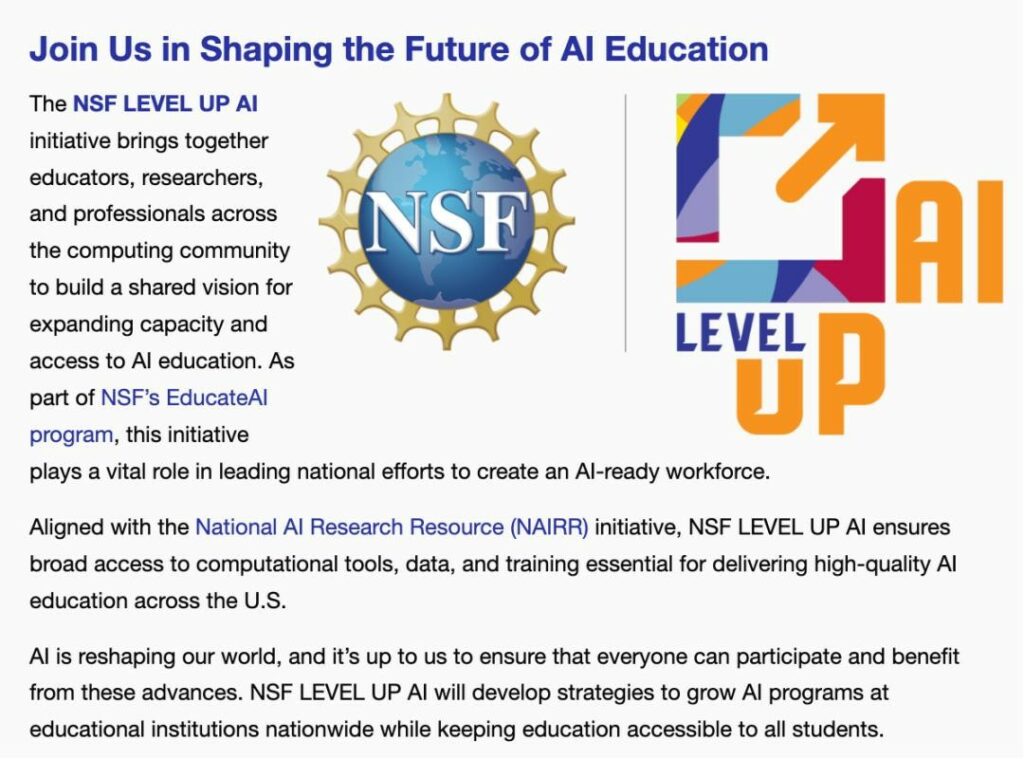
Con l’avanzata inarrestabile dell’intelligenza artificiale nel sistema educativo, college e università americane stanno ripensando profondamente i corsi di informatica. L’obiettivo? Promuovere non solo l’alfabetizzazione all’IA, ma anche il pensiero critico e le competenze comunicative, avvicinando così l’informatica alle discipline umanistiche. Allo stesso tempo, anche le tradizionali facoltà umanistiche si trovano in difficoltà nel valutare elaborati generati (o aiutati) dall’IA.
Non si tratta solo di aggiornare qualche corso: le università americane hanno avviato una vera e propria “riscrittura” collettiva dei programmi di informatica, grazie a un’iniziativa lanciata dalla National Science Foundation, chiamata Level Up AI.
Mary Lou Maher, direttrice della Computing Research Association, ha dichiarato che in futuro l’insegnamento dell’informatica potrebbe spostarsi dall’enfasi sulla programmazione a un focus sul pensiero computazionale e sulla competenza nell’uso dell’intelligenza artificiale. L’informatica potrebbe diventare sempre più simile a una disciplina umanistica, centrata sul pensiero critico e sulla comunicazione.
Certo, servirà tempo prima che queste trasformazioni siano pienamente integrate nei corsi tradizionali, ma il processo sembra irreversibile. Un tempo, gli studenti di informatica imparavano linguaggi come C, basi di dati, algoritmi, reti, strutture dati. Oggi, oltre a dover rincorrere aggiornamenti continui su Python, Java, TypeScript, Go e nuovi framework, emerge una prospettiva diversa: imparare un solo “linguaggio”, quello umano, per dialogare con ChatGPT, Claude, Gemini, DeepSeek e altri assistenti AI.
Alla London Technology Week di giugno, qualcuno lo ha detto apertamente – anche se con una battuta che fotografa bene la realtà: «Il nuovo linguaggio di programmazione del futuro dovrebbe chiamarsi “Human”!».
Grazie all’IA, anche chi non è sviluppatore può “scrivere” codice semplicemente descrivendo l’obiettivo da raggiungere. Si parla perfino di vibe coding, come raccontato nel caso di René Turcios: il modo per programmare diventa “chiedere gentilmente” a un modello AI, come se si parlasse con una persona.

Il progetto Level Up AI, coordinato dalla Computing Research Association con la New Mexico State University, durerà 18 mesi e mira a individuare i contenuti fondamentali per l’insegnamento dell’IA, oltre a raccogliere e condividere le migliori pratiche. Anche la Carnegie Mellon University, leader storica nel settore, sta rivedendo i propri corsi: quest’estate, docenti e staff discuteranno come adattarsi a questo nuovo scenario.
Thomas Cortina, professore e vicerettore a Carnegie Mellon, sostiene un percorso che combini basi solide di informatica e intelligenza artificiale con esperienze pratiche sugli strumenti più recenti. Ma Cortina nota anche un rischio: molti studenti vedono l’IA come una “scorciatoia” per svolgere i compiti di programmazione, senza comprendere a fondo il codice prodotto.
Il risultato? Fare i compiti diventa più semplice, ma trovare lavoro si fa più difficile. Connor Drake, studente all’ultimo anno, racconta di aver dovuto inviare 30 candidature per ottenere un solo colloquio. Una laurea in informatica, che un tempo garantiva sbocchi sicuri, oggi non basta più. Secondo New Intelligence, il tasso di disoccupazione per i laureati in informatica è al settimo posto tra tutte le discipline negli USA; in alcuni casi, anche dottori di ricerca faticano a trovare lavoro dopo mesi di ricerca.
Le iscrizioni a Stanford sono ferme, e a livello nazionale la crescita è quasi nulla (+0,2%). Eppure, ogni ondata tecnologica – dai PC agli smartphone – ha storicamente creato più opportunità per sviluppatori e ingegneri. Alex Aiken, professore a Stanford, prevede però che in futuro la crescita dei posti “classici” nell’ingegneria del software potrebbe rallentare, mentre aumenterà il numero di persone che sapranno comunque scrivere codice, anche senza una formazione tradizionale.
Una ricerca di Harvard aggiunge un dato sorprendente: nel lungo termine, i laureati in storia e scienze sociali tendono a guadagnare di più rispetto ai colleghi di ingegneria o informatica, grazie alle cosiddette “competenze trasversali” come collaborazione, pensiero critico e comunicazione.
In sintesi, mentre i docenti di informatica provano a riformare i corsi per renderli più simili a una laurea in arti liberali, le facoltà umanistiche, a loro volta, devono fare i conti con la rivoluzione dell’intelligenza artificiale. Un paradosso che ci racconta molto sul presente – e soprattutto sul futuro – dell’educazione digitale.
Ti è piaciuto questo articolo? Ne stiamo discutendo nella nostra Community su LinkedIn, Facebook e Instagram. Seguici anche su Google News, per ricevere aggiornamenti quotidiani sulla sicurezza informatica o Scrivici se desideri segnalarci notizie, approfondimenti o contributi da pubblicare.

 Cybercrime
CybercrimeLe autorità tedesche hanno recentemente lanciato un avviso riguardante una sofisticata campagna di phishing che prende di mira gli utenti di Signal in Germania e nel resto d’Europa. L’attacco si concentra su profili specifici, tra…
 Innovazione
InnovazioneL’evoluzione dell’Intelligenza Artificiale ha superato una nuova, inquietante frontiera. Se fino a ieri parlavamo di algoritmi confinati dietro uno schermo, oggi ci troviamo di fronte al concetto di “Meatspace Layer”: un’infrastruttura dove le macchine non…
 Cybercrime
CybercrimeNegli ultimi anni, la sicurezza delle reti ha affrontato minacce sempre più sofisticate, capaci di aggirare le difese tradizionali e di penetrare negli strati più profondi delle infrastrutture. Un’analisi recente ha portato alla luce uno…
 Vulnerabilità
VulnerabilitàNegli ultimi tempi, la piattaforma di automazione n8n sta affrontando una serie crescente di bug di sicurezza. n8n è una piattaforma di automazione che trasforma task complessi in operazioni semplici e veloci. Con pochi click…
 Innovazione
InnovazioneArticolo scritto con la collaborazione di Giovanni Pollola. Per anni, “IA a bordo dei satelliti” serviva soprattutto a “ripulire” i dati: meno rumore nelle immagini e nei dati acquisiti attraverso i vari payload multisensoriali, meno…